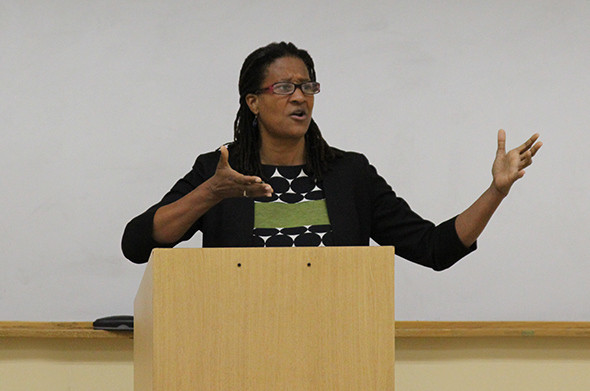Scholar Catherine Smith on Brown vs. Board & Children’s Rights

The landmark U.S. Supreme Court decision handed down in Brown vs. Board of Education is a lauded as pivotal moment for civil rights.
Originally filed by the Brown family and a dozen other Black families against a Topeka, Kansas school district, it contested the constitutionality of forcing Black students to bus to segregated schools and challenged the “separate but equal” doctrine put forth by Plessy v. Ferguson decades earlier.
Earlier this month, University of Denver Sturm College of Law Professor Catherine Smith visited the Stetson Law Campus to assert that the case’s legacy may go beyond its groundbreaking impact on civil rights and education law in the U.S.
“I’m asking you to think of it as a landmark children’s rights case,” she told the audience gathered in the Great Hall and watching virtually over Zoom.
How “separate but equal” reinforced inequality
In Brown, she said, the plaintiffs contended that Black children being required to attend segregated schools in Kansa, South Carolina, Virginia, Delaware, and DC could never be considered equal to schools barring non-white students. The psychological impact of school segregation on Black children, the court recognized, “affected Black children’s hearts and minds in a way unlikely to ever be undone.” Segregation permanently locked children in racial castes, she said, thereby reinforcing racial inequalities.
“So, this lost children’s equality jurisprudence serves as a constitutional check on caste creation by ensuring young people’s advancement on individual merit and preventing state practices that lock classes of children and the groups to which they belong into an underclass, or into a caste – into some sort of group hierarchy,” Smith said.
An unexplored legal realm
Despite what she sees as an obvious avenue for exploring and developing a children’s rights-centered approach that could be applied cases involving juveniles, courts currently apply precedents and tests that stem from adult cases. Smith believes looking at Brown through a children’s rights lens could change that.
“It’s time for us to recognize this nascent children’s equality law and build on it,” she said. “It’s wide-open, I promise you. You will look and not be able to find a doctrine that talks about it in this way that I’ve been able to see.”
Fostering “constructive and healthy discourse” about law
In her remarks ahead of Smith’s lecture, Stetson Law Dean Michèle Alexandre said such discussions are critical.
“National and global events continue to highlight the importance of constructive and healthy discourse about our legal systems, including those that impact our children and other vulnerable populations,” she said. “As legal scholars tasked with training new generations of lawyers and advocates, we are honored to have such a distinguished scholar join us today as part of our charge to facilitate such discourse.”
See a video of Smith’s lecture in its entirety.
Post date: April 14, 2022
Media contact: Kate Bradshaw
[email protected] | 727-430-1580